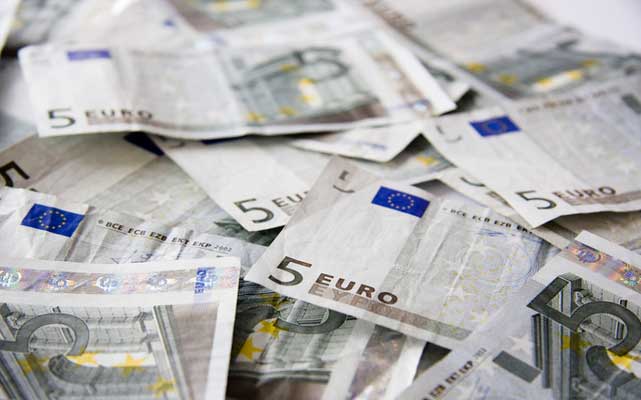Foreign Exchange: Euro a Buy on Sell Dollar Mentality, GBP to EUR Rate Slides
April 9, 2025 - Written by David Woodsmith

The US-China trade war has escalated dramatically overnight with China refusing to back down on increased tariffs on US exports.
In return, President Trump imposed a further 50% tariff on most goods from China which takes the overall tariff to 104%.
Risk appetite deteriorated again with equities under pressure.
At this point, currency and bond moves are potentially more important with the dollar under pressure in global markets while US yields have surged and the Euro has gained net support.
The Pound to Euro (GBP/EUR) exchange rate slumped again to 11-month below 1.1600 before finding some relief.
April 2024 lows come in at 1.1570 and a break below that level would potentially trigger 1.1500.
The Pound to Dollar (GBP/USD) exchange rate has rallied from 1-month lows near 1.2700 to trade around 1.2825.

A further slide in risk appetite would still tend to undermine the Pound.
UoB expects a 1.2740-1.2860 GBP/USD range, but with the risk of higher volatility.
There has been a U-turn from Goldman Sachs; “We have made a major shift in our Dollar view after seeing the developments of the last few weeks and rethinking the likely implications of these policy changes. We now expect recent Dollar weakness to persist.”
MUFG commented; “The unfavourable price action has cast some doubt on the safe haven status of the US government bond market and the US dollar at the time when the global trade war is intensifying.
US developments will be crucial today with Wall Street under intense scrutiny while political developments will also be potentially pivotal with Congress attempting to regain some authority.
Rabobank commented on the latest moves; “The additional tariffs comes in retaliation to the retaliation for the reciprocal tariffs that were apparently imposed in retaliation for long-term cheating on trade. The absurdity of this sequence should make it abundantly clear that the world’s two largest economies are engaged in a tit-for-tat that could conceivably halt bilateral trade altogether.”
China has maintained a hardline stance. Foreign ministry spokesperson, Lin Jian commented; “When challenged, we will never back down,” China will fight to the end if the US side is bent on going down the wrong path.”

When markets take fright, there is demand for defensive plays such as the yen and Swiss franc.
Usually, there is also demand for US bonds and the dollar.
The Swiss franc and Japanese yen have gained support, but there has been a notable dislocation over the past 24 hours with US Treasuries and the dollar (DXY) both sliding.
Rabobank commented; “That dynamic flipped yesterday as the DXY closed lower and yields continued to soar, which perhaps supports views that China (and/or others) is dumping its Treasury holdings to pressure US yields higher and make like difficult for Trump and Bessent.”
The 10-year US yield jumped to above 4.50% before settling around 4.35%.
Danske Bank added; “Rumours about Chinese selling of US assets, hedge funds unwinding their US Treasury exposure and weak demand at yesterday's 3Y Treasury auction were all potential causes.”
According to Deutsche Bank; “US Treasury markets are also experiencing an incredibly aggressive selloff as we go to press, adding to the evidence that they’re losing their traditional haven status.”
It added; “So there’s no sign yet that the market is managing to successfully find a bottom, and it feels like no asset class has been spared as investors continue to price in a growing probability of a US recession.”
ING commented on the dollar; “Just when the dollar seemed to be regaining some confidence, the US decision to go ahead with a tariff hike of 104% on China (alongside all other tariffs) led to a rotation away from the greenback.”
It also sees some scope for European out-performance; “Interestingly, dollar deleveraging favoured European currencies yesterday, perhaps on the view that the measured EU response to US tariffs makes a trade deal more likely.”
The Chinese yuan continued to weaken in global markets with the offshore currency at record lows.
Rabobank commented; “Chinese authorities are clearly allowing the currency to depreciate to offset some of the pain inflicted by US tariffs. This will only further inflame tensions with the White House, given that currency manipulation is one of the US’s major grievances with countries running large trade surpluses.”
A weaker yuan would tend to limit scope for Euro gains in global markets.
STORY LINK Foreign Exchange: Euro a Buy on Sell Dollar Mentality, GBP to EUR Rate Slides

The US-China trade war has escalated dramatically overnight with China refusing to back down on increased tariffs on US exports.
In return, President Trump imposed a further 50% tariff on most goods from China which takes the overall tariff to 104%.
Risk appetite deteriorated again with equities under pressure.
At this point, currency and bond moves are potentially more important with the dollar under pressure in global markets while US yields have surged and the Euro has gained net support.
The Pound to Euro (GBP/EUR) exchange rate slumped again to 11-month below 1.1600 before finding some relief.
April 2024 lows come in at 1.1570 and a break below that level would potentially trigger 1.1500.
The Pound to Dollar (GBP/USD) exchange rate has rallied from 1-month lows near 1.2700 to trade around 1.2825.

A further slide in risk appetite would still tend to undermine the Pound.
UoB expects a 1.2740-1.2860 GBP/USD range, but with the risk of higher volatility.
There has been a U-turn from Goldman Sachs; “We have made a major shift in our Dollar view after seeing the developments of the last few weeks and rethinking the likely implications of these policy changes. We now expect recent Dollar weakness to persist.”
MUFG commented; “The unfavourable price action has cast some doubt on the safe haven status of the US government bond market and the US dollar at the time when the global trade war is intensifying.
US developments will be crucial today with Wall Street under intense scrutiny while political developments will also be potentially pivotal with Congress attempting to regain some authority.
Rabobank commented on the latest moves; “The additional tariffs comes in retaliation to the retaliation for the reciprocal tariffs that were apparently imposed in retaliation for long-term cheating on trade. The absurdity of this sequence should make it abundantly clear that the world’s two largest economies are engaged in a tit-for-tat that could conceivably halt bilateral trade altogether.”
China has maintained a hardline stance. Foreign ministry spokesperson, Lin Jian commented; “When challenged, we will never back down,” China will fight to the end if the US side is bent on going down the wrong path.”

When markets take fright, there is demand for defensive plays such as the yen and Swiss franc.
Usually, there is also demand for US bonds and the dollar.
The Swiss franc and Japanese yen have gained support, but there has been a notable dislocation over the past 24 hours with US Treasuries and the dollar (DXY) both sliding.
Rabobank commented; “That dynamic flipped yesterday as the DXY closed lower and yields continued to soar, which perhaps supports views that China (and/or others) is dumping its Treasury holdings to pressure US yields higher and make like difficult for Trump and Bessent.”
The 10-year US yield jumped to above 4.50% before settling around 4.35%.
Danske Bank added; “Rumours about Chinese selling of US assets, hedge funds unwinding their US Treasury exposure and weak demand at yesterday's 3Y Treasury auction were all potential causes.”
According to Deutsche Bank; “US Treasury markets are also experiencing an incredibly aggressive selloff as we go to press, adding to the evidence that they’re losing their traditional haven status.”
It added; “So there’s no sign yet that the market is managing to successfully find a bottom, and it feels like no asset class has been spared as investors continue to price in a growing probability of a US recession.”
ING commented on the dollar; “Just when the dollar seemed to be regaining some confidence, the US decision to go ahead with a tariff hike of 104% on China (alongside all other tariffs) led to a rotation away from the greenback.”
It also sees some scope for European out-performance; “Interestingly, dollar deleveraging favoured European currencies yesterday, perhaps on the view that the measured EU response to US tariffs makes a trade deal more likely.”
The Chinese yuan continued to weaken in global markets with the offshore currency at record lows.
Rabobank commented; “Chinese authorities are clearly allowing the currency to depreciate to offset some of the pain inflicted by US tariffs. This will only further inflame tensions with the White House, given that currency manipulation is one of the US’s major grievances with countries running large trade surpluses.”
A weaker yuan would tend to limit scope for Euro gains in global markets.
International Money Transfer? Ask our resident FX expert a money transfer question or try John's new, free, no-obligation personal service! ,where he helps every step of the way, ensuring you get the best exchange rates on your currency requirements.
TAGS: Pound Euro Forecasts
Comments are currrently disabled
Related Stories:
- Pound to Euro Week Ahead Forecast: Short-Term Buy, 1.19 by Q3 2025 - April 13, 2025
- Pound-to-Euro Rate Recovers as Dollar Battered on Bond Sell-off - April 12, 2025
- Pound to Euro Forecast: Buy Dips to 1.1430, March 2026 Target 1.1765 say UBS - April 11, 2025
- Pound-to-Euro Forecast: GBP/EUR Slips amid Surging Gilt Yields - April 9, 2025
- Pound to Euro Rate Slides to 1.156 on Latest China Tariff Retaliation - April 9, 2025
- Foreign Exchange: Euro a Buy on Sell Dollar Mentality, GBP to EUR Rate Slides - April 9, 2025
- Pound-to-Euro Rate News Today: Sterling Muted as Markets Turn Positive - April 8, 2025
- Pound Sterling Stabilises Against Euro and Dollar to Benefit on Risk Recovery - April 8, 2025
- Pound Sterling to Euro Forecast Slashed to 1.1765 in 3 Months at Goldman Sachs - April 8, 2025
Latest News:
- Pound to Euro Week Ahead Forecast: Short-Term Buy, 1.19 by Q3 2025 - April 13, 2025
- Pound to Dollar Forecast: Banks Radically Hike 12-month Predictions to 1.30-1.39 - April 13, 2025
- Pound-to-Euro Rate Recovers as Dollar Battered on Bond Sell-off - April 12, 2025
- Euro to Dollar Forecast: Three-Year Best, EUR/USD at 1.20 Possible - April 12, 2025
- Pound to Euro Forecast: Buy Dips to 1.1430, March 2026 Target 1.1765 say UBS - April 11, 2025
- "Sell America": US Dollar Collapse Boosts Safe Havens Yen, Franc and Euro - April 11, 2025
- UK Economy: Pound Sterling Tests 1.30, GDP Boost Eclipsed by US Dollar Slide - April 11, 2025
- Euro to Dollar Forecast RAISED to 1.14 in 12 Months at Danske Bank - April 10, 2025
- Pound to Dollar LIVE: Soft Inflation Print Sends Sterling Past 1.29 - April 10, 2025
- GBP/USD Prediction: Pound Sterling Outlook Flips "Neutral-Bullish" say Scotiabank - April 10, 2025








